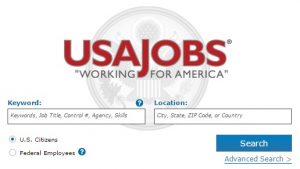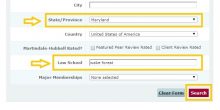
USAJobs.gov is the clearinghouse for job opportunities with the government.
If you are interested in government jobs, you might already know that USAJobs.gov is the clearinghouse for job opportunities with the government. Listings on the site include student and non-student jobs which makes it a good resource for temporary summer positions and permanent positions.
Janice Johnson (JD ’17) had first-hand experience with using USAJobs during her extensive career prior to attending law school. After completing her undergraduate studies in Boston, Janice worked in Europe and with the U.S. Department of State. In this blog post, Janice offers her advice and personal tips on how to navigate the USAJobs web site and ultimately land a government job.
Tactics on How Best to Start
USAJobs has countless agencies, departments, and sectors that you may not even have thought about or knew existed. Interested in energy law? There are energy specialists in each agency, not just in the Department of Energy. As a rule of thumb: start big. It’s also wise to start by picking your geographic preference and then just browsing the listings for that area. You should also be attentive to jobs that are not categorized as attorney positions, but where your law degree will give you an advantage and/or help you meet the other position requirements.
When It’s Time to Apply
In order to apply for any job on USAJobs, you will first need to have available your complete, thorough work and volunteer history. From the time you click “Apply for this Position,” you will be prompted to the site’s resume builder. A time-consuming ordeal, yes, but once you use the resume builder, you will be able to save the resume profile in the system, so it will be easy to apply to future jobs.
Important Application Tips
Use the keywords in the job description when filling out the resume builder. There is a meticulously designed computer program that scans through the resumes on USAJobs and ranks resumes on several different factors such as keywords. These keywords will get matched in the computer system, making you a better match for the job than those applicants who do not use keywords from the description. For example, if the position is looking for drafting experience, be sure you have the word “drafting” in your resume profile.
Also, think broadly when it comes capturing your years of experience for certain listings. For example, let’s say the position in which you are applying is asking for a number of years of leadership experience. Leadership experience can include things such as cheerleading coaching, retail management experience, Boy Scout and Girl Scout leadership, etc. So if you’re comfortable talking about it in an interview, then use it.
If there is a requirement or an option to add a cover letter or transcript, be sure you upload those documents. Always cater your cover letter to each job just like you would if applying to a law firm or any other employer. A carefully crafted cover letter can be the difference between your getting an interview or being passed aside. And don’t worry about your resume being too long. The government is okay with long resumes as they would rather know too much, than not enough.
Word of Mouth & Networking Bonuses
You can’t discount the potential value of knowing someone within government agencies whether it’s a friend, former classmate, family member, or colleague. Personal connections still work and knowing someone can make a huge impact on your application status and getting called in for an interview. Connections can put in a good word for you, despite the HR department having to go through the whole stack of resumes. News regarding upcoming positions also travel via word of mouth, often before they are even posted on USAJobs.gov so knowing someone in the department or agency can give you advance time to gather all of the necessary application materials.
After Applying
After applying and interviewing, you may receive an offer (YAY!). Just note that there will still be a security clearance and credit check you will need to pass. Your job offer will be for conditional hiring only, contingent on this background check. The length of the security clearance process varies and sometimes the process can take up to a full year to complete. This is why many summer internships open up in November so that they can close out in December to allow enough time to complete the full process. At this time, the government is okay with credit card debt such as retail store cards and personal credit cards. However, any delinquent debt, especially student loan debt, will likely delay the clearance process.
The entire USAJobs application process can be a long one. Fortunately, the system’s email notifications do help inform you on whether you will proceed to the next step or if your application has not been accepted. Whatever you do, do not get discouraged! Apply. Then apply again, even if it’s the same job you applied to before. Human resources will not notice that you’ve applied 8 times, nor would it make a difference in your hiring. There is no limit to how many times you can apply to a position. Perhaps you might have been ranked lower before and now you have more experience under your belt so be sure you are updating and adding new experiences often to your USAJobs profile. Your efforts will eventually be rewarded for all your time and hard work!







